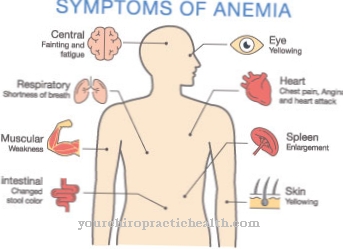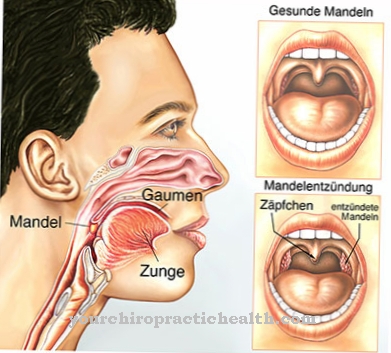The delirium is a state of mental confusion. People who suffer from it lose their cognitive and mental abilities, among other things, and must be treated immediately. Delirium can also be prevented.
What is delirium?

© ysuel - stock.adobe.com
Delirium, often called Delirium means a state of mental confusion in medicine. Affected people suffer from disorders of consciousness and the ability to think and are often physically ailing. The causes of the disease are diverse and range from alcohol and drug abuse to cardiovascular diseases to fractures and malnutrition.
The possible symptoms that can accompany delirium are just as diverse. Treatment focuses on correcting the root cause, using only medication to address the specific symptoms of delirium.
causes
The causes of delirium depend on various factors. Normally, the symptom is caused by central nervous disorders, among other things. This includes bleeding, vascular diseases and tumors as well as epilepsy, meningitis, encephalitis and migraines. Sleep deprivation can also trigger some form of delirium. Likewise systemic diseases, i.e. infections as well as fever, deprivation or electrolyte disorders.
Metabolic disorders such as hyperglycaemia, kidney failure or anemia are also known to be causes of delirium. The same is true of acidosis, alkalosis, vitamin deficiencies, and various types of obstructive sleep apnea. Medicines and delirium as well as drugs and their withdrawal are possible triggers of delirium. So too do malnutrition, fractures, head injuries and hypoxia.
The most common cause is alcohol withdrawal from alcoholism. This so-called delirium tremens is also known as alcohol withdrawal delirium. In addition, delirium can also be triggered by diseases of the heart, such as cardiac arrhythmias and heart failure, as well as shock. Even pulmonary embolism or myocardial infarction can cause delirium. Due to the multitude of possible causes, it is even more important to see a doctor at the first sign.
You can find your medication here
➔ Medicines against impaired consciousness and memory problemsSymptoms, ailments & signs
Delirium is associated with a wide variety of complaints. Those affected primarily suffer from a disorder of consciousness and attention. This leads to perception disorders, memory is impaired and the ability to orientate decreases.
In addition, psychomotor disorders can occur, which can range from excessive emotions to poor concentration to a complete change in personality structure. People who are delirious are no longer able to carry out abstract thought processes and have limited short-term memory.
If the delirium is fully developed, there are also sleep disorders, hallucinations and mood disorders such as depression, anxiety or irritability. This in turn creates agitation, i.e. pathological restlessness, which intensifies the symptoms mentioned again. For these reasons, prompt treatment of delirium is essential.
Diagnosis & course
The diagnosis can usually be made by a doctor based on the symptoms. In addition, certain test procedures such as CAM are carried out, which can be used to measure the severity of the delirium. The actual cause is difficult to determine due to the multitude of possible factors and diseases. Because of this, diagnosis initially focuses on a careful recording of the medical history.
The anamnesis clarifies whether and what pre-existing illnesses are present, whether there is alcohol or drug abuse and what the general living situation of the patient is. This enables a comprehensive picture to be created, which is just as helpful in finding the cause as it is in the subsequent treatment. Treated early, the chance of a full recovery is relatively high. Delirium can also be fatal, depending on the cause.
Complications
Because delirium is a group of symptoms, there are usually many different complications. In most cases, the patient is very adept and has impaired perception. This can have a strong influence on everyday life and life and reduce the quality of life.
Delirium also leads to insomnia, headaches and, not infrequently, dizziness. The patient feels tired and exhausted and is no longer able to perform heavy physical activities. Attention is also reduced by delirium, so that concentration disorders occur.
In most cases, the symptom has a negative effect on social contacts and personal surroundings. The clouding of consciousness can even lead to a coma. However, this case often only occurs with substance abuse and can be resolved by withdrawal.
If the delirium is caused by an infection or a severe inflammation, medical treatment is necessary and usually leads to success. In many cases, delirium is diagnosed late by a doctor, which makes treatment difficult. Especially with withdrawal, delirium can lead to life-threatening situations that must be monitored by a doctor.
When should you go to the doctor?
Unusual states of mental confusion should always be examined and treated by a doctor. In many cases, those affected are dependent on help from people in their immediate vicinity. Part of the clinical picture of delirium is that sick people often do not understand sufficiently what is happening around them or where they are currently.
A doctor is needed as soon as orientation is lost for several minutes or unusual memory disorders occur. If sleep disorders occur over several days or weeks for incomprehensible reasons or if there are interruptions in psychomotor functions, medical examinations should be initiated.
People who suffer from epileptic seizures are well advised to have regular preventive examinations. If the fever lasts for several days, this is considered unique and must also be examined. A medical check-up is required in the event of severe weight loss or an undersupply of the organism.
If the person concerned is withdrawn from alcohol or drugs, they should be permanently and completely monitored by a doctor. The first indication of complications must be able to intervene in order to avoid a danger to life. An emergency doctor must be called in the event of disorders of consciousness. This is a life-threatening condition that requires immediate action.
Doctors & therapists in your area
Treatment & Therapy
Treatment for delirium depends entirely on the cause and progression of each symptom. In general, it is important to react quickly as delirium can be life-threatening. Especially in older patients it is necessary to rule out possible causes such as desiccosis or pneumonia at an early stage and to start treatment.
The actual therapy can be carried out with various drugs such as clonidine or dexmedetomidine. Neuroleptics and benzodiazepines are also used and often improve the symptoms. That being said, therapy depends on the cause. A delirium tremens is treated with the drugs mentioned, a delirium that arises as a result of a fracture can only be remedied after the injury has been treated.
Arousal states that arise as a result of shock or trauma can be treated with haloperidol and similar neuroleptics. In the case of delirium due to malnutrition, clinical treatment is essential. Even with alcohol delirium, it is necessary to treat the patient in the clinic. The vital functions must be continuously monitored due to the respiratory depressive effect of some drugs.
Outlook & forecast
In most cases, delirium is considered to be a temporary phenomenon and therefore has a favorable prognosis. Once the cause has been treated and subsided, the symptoms go away. Medical treatment is not always required for this.
If there is a state of mental confusion due to the influence of alcohol, the cognitive abilities return with the natural breakdown of the alcohol in the blood. The patient regains his or her skills within a day.
Medical care is required for serious causes, as otherwise a life-threatening situation can arise. The mostly reversible disorder is often a warning signal from the human organism. Therefore, the prognosis for delirium is usually good. The full picture of the disease is reduced within a few days.On average, the delirium lasts about a week. The prognosis improves with rapid treatment.
The underlying disease, on the other hand, can indicate complex disorders and may not be curable. In severe cases, the patient suffers from a degenerative brain disease. In this disease, the delirium can last for several weeks and, in the worst case, lead to death. If the underlying disease is severe, the mental confusion can be a sign of a final stage of the disease. These affected people are in an irreparable state of health.
You can find your medication here
➔ Medicines against impaired consciousness and memory problemsprevention
Delirium can be prevented by identifying and minimizing the risk factors. Since the abuse of medication, alcohol or drugs often leads to delirium, it is important to limit the consumption of these drugs. Medicines such as antidepressants or heart medication should also only be taken after consulting a doctor.
A possible alcohol or drug withdrawal must always take place in close supervision by a doctor in order to minimize the risk of delirium. Elderly people can also prevent delirium by eating a balanced and rich diet. Not only older people should consult a doctor regularly in order to discover any diseases that can trigger delirium at an early stage.
Aftercare
Follow-up care after delirium includes discussions with the person affected and general accompanying measures. Attention from relatives and doctors, who convey a feeling of security, is particularly effective. In addition to this, any problems falling asleep or staying asleep must be treated by learning suitable relaxation techniques.
For example, techniques such as autogenic training, yoga or classical physiotherapy have proven themselves. If the symptoms persist, we recommend taking a natural sleep aid from the field of naturopathy. Effective agents contain, for example, Gaba, St. John's wort or red oil.
In order to avoid the development of anxiety disorders, the person concerned must carefully inform himself or be informed about the delirium. In the case of postoperative states of confusion, information sheets are usually offered, which offer the patient and his relatives an orientation. Follow-up care also includes dealing with the underlying disease.
Delirium due to alcoholism, for example, can only be treated in conjunction with causal therapy. Those affected need comprehensive follow-up care that is adapted to the circumstances of the delirium. In most cases, psychotherapeutic assistance can significantly reduce the psychological burden and contribute to greater well-being in the patient. Coming to terms with delirium is an essential part of self-help.
You can do that yourself
Whether and what an affected person can do himself in the event of delirium depends above all on its causes. Deliria resulting from the abuse of alcohol and other mind altering drugs are common. Anyone who is addicted to drugs or who fears it should seek professional help immediately. The first point of contact is the family doctor. If the drug addiction was triggered by mental problems, psychotherapy is usually indicated. Self-help groups, such as Alcoholics Anonymous, support those affected with withdrawal.
The side effects of delirium, in particular perception disorders and hallucinations, often ensure social isolation of the person concerned, the psychological consequences of which can exacerbate the underlying disease. Patients should therefore confide in their immediate social environment and openly address their illness.
Symptoms such as insomnia, headaches or nausea can be combated with over-the-counter medication from the pharmacy, but this should only be done after consulting the treating doctor. Patients who suffer from impaired sense of balance can reduce the risk of accidents by using a wheelchair or walking aid.
If the delirium is due to constant malnutrition or acute vitamin deficiency, an adjustment of the diet and the use of food supplements are indicated. If the reason for the malnutrition is psychological, the help of a therapist should be sought.
























.jpg)



